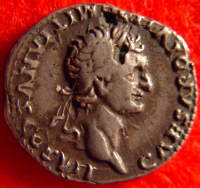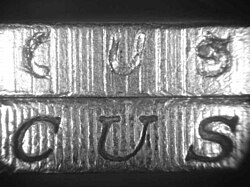
Coin counterfeiting of valuable antique coins is common; modern high-value coins are also counterfeited and circulated. Counterfeit antique coins are generally made to a very high standard so that they can deceive experts. This is not easy and many coins still stand out.
History
See also: Counterfeit moneyCounterfeits of higher-value coins in circulation, designed for general circulation at face value, have been made by criminals for thousands of years.
Circulating coins
See also: Slug (coin)

For modern coins in general circulation, the most common method of protection from forgeries is the use of bi-metallic coins made of two metals of different color, which are difficult to counterfeit at low cost. The most common way of forging these coins is to change the area that should be a different color by painting it; however, the paint is often easy to scratch off and the coins soon look very crude once worn. An increasing number of coins are cast from the same composition alloy as the real coin, but have poor reproduction of details such as the milling on the side of the coin and the stamped lettering.
When the euro was introduced into Europe, there were initially very few counterfeits; however, the number increased massively as time went by. The high and increasing number of fake euro coins in circulation in 2004 led to the creation of a Technical and Scientific Center for the coordination of technical actions to protect euro coins against counterfeiting. Between 2002 and 2006, approximately 400,000 counterfeit euro coins were removed from circulation; however, "the overall number is very small by historical standards and by comparison to the 69 billion circulating (genuine) euro coins."
In 2014, it was estimated that 3.04% of all UK £1 coins in circulation are counterfeit. These coins were replaced on 15 October 2017 with new, harder to counterfeit, 12-sided bi-metallic coins.
Collectible counterfeit coins
A well known and popular numismatic item is the 1944 nickel counterfeited by Francis LeRoy Henning. Unlike official specimens, this spurious item is missing a large mintmark for the Philadelphia Mint. Because of a different wartime composition, all nickels of this period had large mintmarks. Normally the Philadelphia mint would not have included one, but in 1944 all of its nickels had a "P" above the dome of Monticello. It is estimated that 100,000 of these coins were placed into circulation. Today they remain readily available to collectors.

Both scarce 1923-D and 1930-D dimes were found in circulation, and they are of interest to collectors since no such date-mint combinations were issued for this particular denomination. It has been suggested that they may have been part of an attempt by the Soviet Union to sell its silver on the world market by counterfeiting (with full precious metal weight) U.S. coins. If so, the engravers blundered by producing "impossible" coins.
Among the examples of counterfeits of high-value collectible coins are the "Omega" coins produced in the early 1970s by an unknown counterfeiter who signed his creations with a miniature Greek letter omega, and so came to be known as the Omega man. He is believed to have made over 20,000 fake 1907 high-relief nominally US$20 gold Double Eagle coins with the signature omega in the claw of the eagle, worth hundreds of millions of dollars at today's prices. His counterfeits are of such high quality that collectors will pay upwards of $1,000 for one; although a genuine coin sells for about $50,000 to $100,000. The same counterfeiter also counterfeited other US gold coins, including a large quantity of $3 gold pieces, dated 1874, 1878 and 1882, with the 1882 being the most prevalent. Three of the counterfeit $10 gold pieces, the 1910-P, the 1913-P and the 1926-P, have the omega placed upside down within the upper loop of the "R" of "LIBERTY" in the Native American's headdress.

See also
References
- Forgotten Coins of the North American Colonies, Amazon Books, John Lorenzo (2017).
- Identify counterfeit coins with images Counterfeit Silver Dollar Image Comparisons
- C. R. Gagg and P. R. Lewis, Counterfeit coin of the realm – review and case study analysis, Second International Conference on Engineering Failure Analysis (ICEFA-11), Toronto, Canada, Sept. 2006, Engineering Failure Analysis, Vol 14, No 6, 1144 – 1152, 2007.
- Forensic Materials Engineering: Case studies, Lewis, PR, Gagg, C and Reynolds, K, CRC Press (2004).
- Coin Counterfeiting Archived 2022-05-23 at the Wayback Machine, Counterfeit Coins (2007-26-09)
- "Counterfeit Coin Newsletter". Archived from the original on 2007-10-14. Retrieved 2007-10-08.
- EU Crackdown Archived 2012-10-01 at the Wayback Machine, Counterfeit Coins(2007-26-09)
- "EU press release". Europa, the official European Union website. Archived from the original on 2018-06-12. Retrieved 2011-12-28.
- "How can I spot a fake £1 coin?". 19 March 2014. Archived from the original on 17 June 2022. Retrieved 3 April 2018.
- Smith, Sophie (25 July 2017). "All change: round pound deadline is midnight tonight - how many do you have left?". The Telegraph. Archived from the original on 19 April 2021. Retrieved 12 June 2018.
- "Henning Counterfeit Nickel". Archived from the original on 2015-04-02. Retrieved 2015-03-09.
- "Mercury Dimes > Ch 4 > Counterfeit & Altered Coins". Archived from the original on 2015-04-02.
- "Counterfeit Detection: 1907 High Relief Saint-Gaudens Double Eagle | NGC". www.ngccoin.com. Archived from the original on 2024-01-30. Retrieved 2024-01-30.
- "Counterfeit Detection: 1882 $3 Gold Piece | NGC". www.ngccoin.com. Archived from the original on 2024-01-30. Retrieved 2024-01-30.
- Secrets of the U.S. Mint. Travel Channel. Aired 2006-03-20.
- Travers, Scott A. (2008). The Coin Collector's Survival Manual (6 ed.). New York: Random House. pp. 145–147. ISBN 978-0-375-72305-6.
